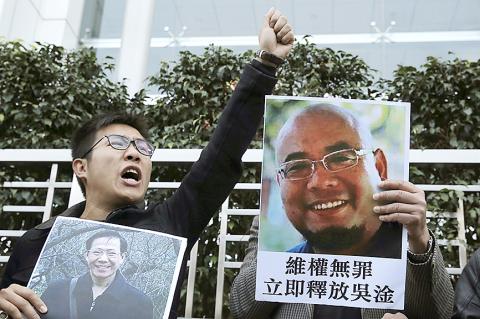China’s Wuhan Intermediate People’s Court yesterday sentenced political campaigner Qin Yongmin (秦永敏) to 13 years in jail for “subversion of state power.”
It appears to be the heftiest sentence handed down in China for “subversion” in the past 15 years, court records showed.
The 64-year-old, first jailed as a “counter-revolutionary” from 1981 to 1989, has already spent a total of 22 years behind bars.

Photo: AP
At the time of his arrest in January 2015, Qin was head of the pro-democracy China Human Rights Watch group, which circulated online statements denouncing government policies and organized discussion groups.
Qin had “refused to cooperate with the court” and remained completely silent during his trial in May, lawyer Lin Qilei (藺其磊) previously said.
His other lawyer, Liu Zhengqing (劉正清), vowed to appeal, telling reporters that Qin was in “despair” about the sentencing and “angry at the rogue regime” in China.
Prosecutors cited Qin’s writings on democracy as evidence, including a passage in which he called on young Chinese to fight for human rights protections according to UN treaties.
Qin was last convicted and sentenced to prison in late 1998 after he and other activists sought to officially register the China Democracy Party. He was released in December 2010.
Upon his release, Qin said that police had told him not to speak with journalists, while several of his supporters who had hoped to meet him have disappeared.
Chinese Human Rights Defenders researcher Frances Eve said that Qin was “prosecuted for his belief in a democratic China, as well as his actions in advocating for human rights.”
“Authorities have been unable to build a case against him, despite three years of investigation,” Eve added.

‘LAGGING BEHIND’: The NATO secretary-general called on democratic allies to be ‘clear-eyed’ about Beijing’s military buildup, urging them to boost military spending NATO Secretary-General Mark Rutte mentioning China’s bullying of Taiwan and its ambition to reshape the global order has significance during a time when authoritarian states are continuously increasing their aggression, the Ministry of Foreign Affairs (MOFA) said yesterday. In a speech at the Carnegie Europe think tank in Brussels on Thursday, Rutte said Beijing is bullying Taiwan and would start to “nibble” at Taiwan if Russia benefits from a post-invasion peace deal with Ukraine. He called on democratic allies to boost defense investments and also urged NATO members to increase defense spending in the face of growing military threats from Russia

LEAP FORWARD: The new tanks are ‘decades more advanced than’ the army’s current fleet and would enable it to compete with China’s tanks, a source said A shipment of 38 US-made M1A2T Abrams tanks — part of a military procurement package from the US — arrived at the Port of Taipei early yesterday. The vehicles are the first batch of 108 tanks and other items that then-US president Donald Trump announced for Taiwan in 2019. The Ministry of National Defense at the time allocated NT$40.5 billion (US$1.25 billion) for the purchase. To accommodate the arrival of the tanks, the port suspended the use of all terminals and storage area machinery from 6pm last night until 7am this morning. The tanks are expected to be deployed at the army’s training

TECH CONFERENCE: Input from industry and academic experts can contribute to future policymaking across government agencies, President William Lai said Multifunctional service robots could be the next new area in which Taiwan could play a significant role, given its strengths in chip manufacturing and software design, Taiwan Semiconductor Manufacturing Co (TSMC, 台積電) chairman and chief executive C.C. Wei (魏哲家) said yesterday. “In the past two months, our customers shared a lot of their future plans with me. Artificial intelligence [AI] and AI applications were the most talked about subjects in our conversation,” Wei said in a speech at the National Science and Technology Conference in Taipei. TSMC, the world’s biggest contract chipmaker, counts Nvidia Corp, Advanced Micro Devices Inc, Apple Inc and

PEACEFUL RESOLUTION: A statement issued following a meeting between Australia and Britain reiterated support for Taiwan and opposition to change in the Taiwan Strait Canada should support the peaceful resolution of Taiwan’s destiny according to the will of Taiwanese, Canadian lawmakers said in a resolution marking the second anniversary of that nation’s Indo-Pacific strategy on Monday. The Canadian House of Commons committee on Canada-Chinese relations made the comment as part of 34 recommendations for the new edition of the strategy, adding that Ottawa should back Taiwan’s meaningful participation in international organizations. Canada’s Indo-Pacific Strategy, first published in October 2022, emphasized that the region’s security, trade, human rights, democracy and environmental protection would play a crucial role in shaping Canada’s future. The strategy called for Canada to deepen